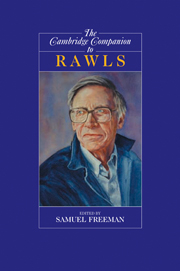Book contents
- Frontmatter
- Introduction
- 1 Rawls and Liberalism
- 2 For a Democratic Society
- 3 Rawls on Justification
- 4 Rawls on the Relationship between Liberalism and Democracy
- 5 Difference Principles
- 6 Democratic Equality
- 7 Congruence and the Good of Justice
- 8 On Rawls and Political Liberalism
- 9 Constructivism in Rawls and Kant
- 10 Public Reason
- 11 Rawls on Constitutionalism and Constitutional Law
- 12 Rawls and Utilitarianism
- 13 Rawls and Communitarianism
- 14 Rawls and Feminism
- Bibliography
- Index
Introduction
John Rawls – An Overview
Published online by Cambridge University Press: 28 May 2006
- Frontmatter
- Introduction
- 1 Rawls and Liberalism
- 2 For a Democratic Society
- 3 Rawls on Justification
- 4 Rawls on the Relationship between Liberalism and Democracy
- 5 Difference Principles
- 6 Democratic Equality
- 7 Congruence and the Good of Justice
- 8 On Rawls and Political Liberalism
- 9 Constructivism in Rawls and Kant
- 10 Public Reason
- 11 Rawls on Constitutionalism and Constitutional Law
- 12 Rawls and Utilitarianism
- 13 Rawls and Communitarianism
- 14 Rawls and Feminism
- Bibliography
- Index
Summary
PRELIMINARIES
John Rawls's published works extend over fifty years from the middle of the twentieth century to the present. During this period his writings have come to define a substantial portion of the agenda for Anglo-American political philosophy, and they increasingly influence political philosophy in the rest of the world. His primary work, A Theory of Justice (TJ), has been translated into twenty-seven languages. Only ten years after Theory was published, a bibliography of articles on Rawls listed more than 2,500 entries. This extensive commentary indicates the widespread influence of Rawls's ideas as well as the intellectual controversy his ideas stimulate.
From the outset Rawls’s work has been guided by the question, “What is the most appropriate moral conception of justice for a democratic society?” (TJ, p. viii/xiii rev.). In Theory he pursued this question as part of a more general inquiry into the nature of social justice and its compatibility with human nature and a person’s good. Here Rawls aimed to redress the predominance of utilitarianism in modern moral philosophy. As an alternative to utilitarianism, Rawls, drawing on the social contract tradition, developed a conception of justice “that is highly Kantian in nature” (TJ, p. viii/xviii rev.). According to this conception, justice generally requires that basic social goods – liberty and opportunity, income and wealth, and the bases of self – respect – be equally distributed, unless an unequal distribution is to everyone’s advantage ((TJ, p. 62/54 rev.). But under favourable social conditions a special conception, “justice as fairness,” applies; it requires giving priority to certain liberties and opportunities via the institutions of a liberal constitutional democracy.
- Type
- Chapter
- Information
- The Cambridge Companion to Rawls , pp. 1 - 61Publisher: Cambridge University PressPrint publication year: 2002
- 22
- Cited by



